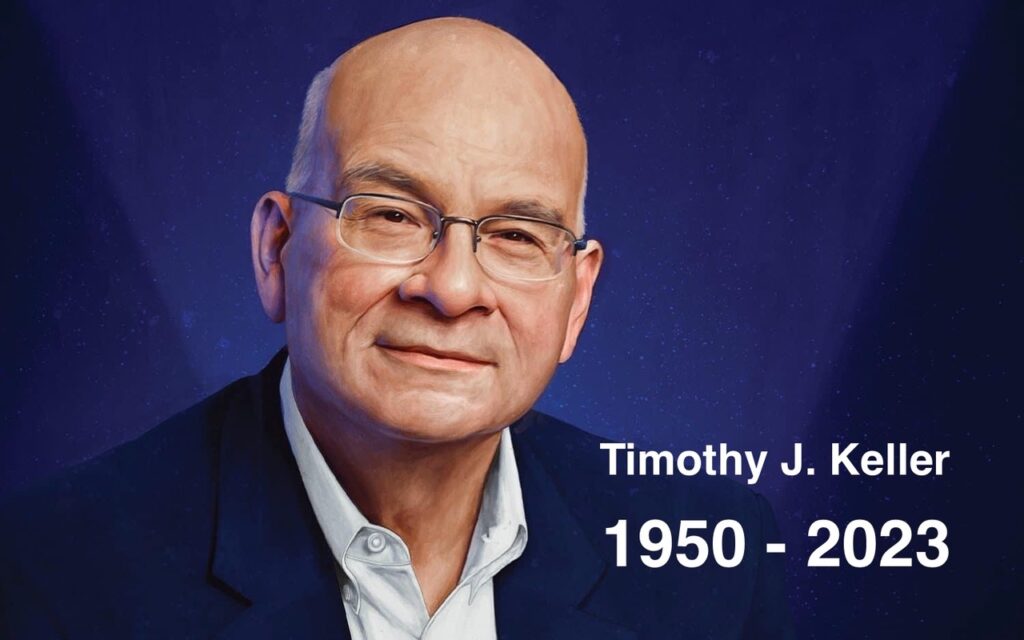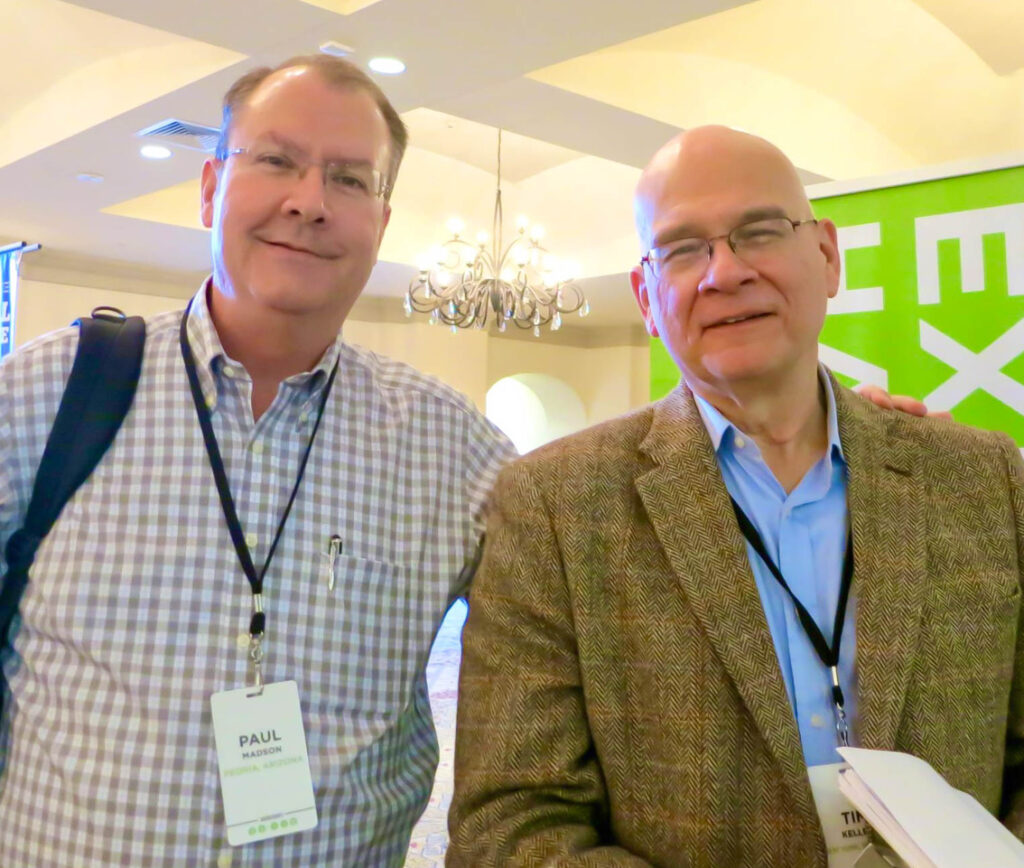
“A giant has left us.”
– Dr. D.A. Carson
(Distinguished Emeritus Professor of New Testament
at Trinity Evangelical Divinity School)
Most of you, by now, are aware that Tim Keller passed away last week.
I don’t have the words to express my profound gratitude for Tim Keller. His books and sermons have influenced my life, marriage, and ministry. I have read almost all of Tim’s books. Tim was a combination of John Stott, C.S. Lewis, and Billy Graham. He was thoughtful, compelling, gentle, winsome, kind, steadfast, gracious, and brilliant… yet humble. Tim’s legacy is deep and wide and truly immeasurable.
The day before God took him home, Tim shared this with his family:
“I’m thankful for all the people who’ve prayed for me over the years.
I’m thankful for my family, that loves me.
I’m thankful for the time God has given me, but I’m ready to see Jesus.
I can’t wait to see Jesus.
Send me home.”
(Tim Keller – May 17, 2023)
Tim’s son, Michael, posted this about Tim’s passing:
“Timothy J. Keller, husband, father, grandfather, mentor, friend, pastor, and scholar, died this morning at home. Dad waited until he was alone with Mom. She kissed him on the forehead, and he breathed his last breath. We take comfort in some of his last words, ‘There is no downside for me leaving, not in the slightest.’ See you soon Dad.”
(Michael Keller — on behalf of the entire Keller family)
“For me, to live is Christ, to die is gain.”
(Philippians 1:21)

In honor of Tim’s impact upon my life, I’d like to share some of my favorite quotes from his books. I started out with my “Top 10.” Then I realized that would not work, so I tried my “Top 20.” That was still too few. So, lest this article be too long, I stopped at my “Top 30.”
Here are my 30 “Quotable Quotes” that I have gathered over the years from Tim Keller. I pray you would be as encouraged and blessed by them as I have.
APOLOGETICS
“If Jesus rose from the dead, then you have to accept all He said; if He didn’t, then why worry about any of what He said?”
“If there is no God, then either original matter sprang from nothing, or original matter has always existed without a cause, or there is an infinite regress of causes without a beginning. Each of these answers takes us out of the realm of science and the universe we know. They are nothing short of miracles.”
“Everyone will be forgotten, nothing we do will make any difference, and all good endeavors, even the best, will come to naught. Unless there is God. If the God of the Bible exists, and there is a True Reality beneath and behind this one, then this life is not the only life, then every good endeavor, even the simplest ones, pursued in response to God’s calling, can matter forever.”
“Jesus himself is the main argument for why we should believe Christianity.”
“To stay away from Christianity because part of the Bible’s teaching is offensive to you assumes that if there is a God, he wouldn’t have any views that upset you. Does that belief make sense?”
“There’s a kind of doubt that really is seeking more information—that ‘wants’ to believe if it’s possible. There’s also a kind of doubt that really is looking for a way out, that doesn’t want to believe or submit, that’s looking for a way to keep control of one’s own life. In Scripture, there is a wonderfully nuanced approach to doubt. The Bible doesn’t view doubt as always rebellious, nor does it encourage people to live in doubt perpetually. That’s why we’re told to ‘be merciful to those who doubt’ (Jude 1:22).”
“Tolerance isn’t about not having beliefs. It’s about how your beliefs lead you to treat people who disagree with you.”
“Never describe the view of an opponent in a way he or she will not own. Rather describe their view so they say, ‘I couldn’t have put it better myself.’ Only then should you proceed to refute the view. If, instead, you caricature your opponent – you persuade no one.”
CHRISTIAN LIVING
“The Christian Gospel is that I am so flawed that Jesus had to die for me, yet I am so loved and valued that Jesus was glad to die for me. This leads to deep humility and deep confidence at the same time. It undermines both swaggering and sniveling. I cannot feel superior to anyone, and yet I have nothing to prove to anyone. I do not think more of myself nor less of myself. Instead, I think of myself less.”
“The way of wisdom is not the way of quick fixes and dramatic turnarounds. It is the way of long training and discipline.”
“You can love without agreeing with someone. You can disagree without hating them.”
“If our identity is in our work, rather than Christ, success will go to our heads, and failure will go to our hearts.”
“[These are] Christianity’s unsurpassed offers—a meaning that suffering cannot remove, a satisfaction not based on circumstances, a freedom that does not hurt but rather enhances love, an identity that does not crush you or exclude others, a moral compass that does not turn you into an oppressor, and a hope that can face anything, even death.”
“All death can now do to Christians is to make their lives infinitely better.”
“True gospel-humility means I stop connecting every experience, every conversation, with myself.”
“The claim that Jesus is God… means not just hope for the world, despite all its unending problems, but hope for you and me, despite all our unending failings.”
“The incarnation is the universe-sundering, history-altering, life-transforming, paradigm-shattering event of history [God took on flesh].”
“Christmas means that race, pedigree, wealth, and status do not ultimately matter. It means not being prejudiced against the poor—and not being biased against or for the well-off. We must not be snobs or snobs about snobs.”
“When you say, ‘Doctrine doesn’t matter; what matters is that you live a good life,’ that is a doctrine. It is called the doctrine of salvation by your works rather than by grace.”
MARRIAGE
“When over the years someone has seen you at your worst and knows you with all your strengths and flaws, yet commits him – or herself to you wholly, it is a consummate experience. To be loved but not known is comforting but superficial. To be known and not loved is our greatest fear. But to be fully known and truly loved is, well, a lot like being loved by God. It is what we need more than anything. It liberates us from pretense, humbles us out of our self-righteousness, and fortifies us for any difficulty life can throw at us.”
“Within this Christian vision of marriage, here’s what it means to fall in love. It is to look at another person and get a glimpse of what God is creating, and to say, ‘I see who God is making you, and it excites me! I want to be part of that. I want to partner with you and God in the journey you are taking to his throne. And when we get there, I will look at your magnificence and say, ‘I always knew you could be like this. I got glimpses of it on earth, but now look at you!”
PREACHING & TEACHING
“Only if we [preachers and teachers] hammer home the gospel, that we are loved sinners in Christ – so loved that we don’t have to despair when we do wrong, so sinful that we have no right to be puffed up when we do right – can we help our listeners escape the spiritually bipolar world of moralism.”
THE GRACE AND MERCY OF GOD
“If you were a hundred times worse than you are, your sins would be no match for his mercy.”
“We would be more patient and kind with people and less hurt if we regularly remembered that we all have deep core faults.”
“When we grasp that we are unworthy sinners saved by an infinitely costly grace, it destroys both our self-righteousness and our need to ridicule others.”
“Having received such grace, Christians have a compelling reason to be remarkably gracious, inviting, and endearing toward others, including and especially those who disagree with us.”
“It is because of the doctrine of judgment and hell that Jesus’ proclamations of grace and love are so astounding.”
“We are more sinful and flawed than we ever dared believe, yet more loved and accepted in Jesus than we ever dared hope.”
“Forgiveness, then, is a form of voluntary suffering. In forgiving, rather than retaliating, you make a choice to bear the cost.”
“Only this doctrine [the substitutionary atonement of Christ on the cross] keeps us from thinking God is mainly holy with some love or mainly loving with some holiness—but instead is both holy and loving equally, interdependently.”
“So if someone asks you if you are a Christian, you should not say, ‘Of course!’ There should be no ‘of course-ness’ about it. It would be more appropriate to say, ‘Yes, I am, and that’s a miracle. Me! A Christian! Who would have ever thought it? Yet he did it, and I’m his.”



Leave a Reply